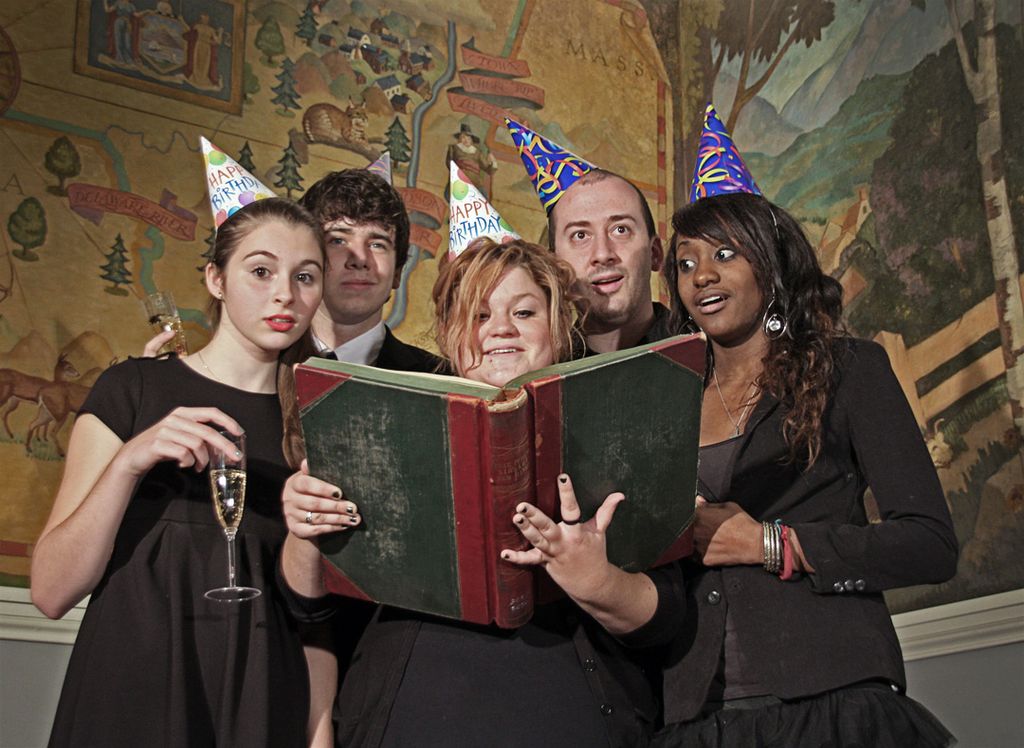The Institute Library, which is now serving as a home for the New Haven Review, is about to see a big shift. It's an exciting change, but one I cannot help, personally, but be a little sad about. After three years, Will Baker is leaving his post as Executive Director of the Library, and moving to Pittsburgh. Now, I'm sure he'll have a grand old time there, as he is known for his love of Rust Belt cities. But this small New England city will not be the same without him.
The Board of Directors of the Library spent a few months working on selecting a new Executive Director, and it was, I can tell you, a strange process filled with unexpected turns. I was, myself, on the search committee, and we read resumes from people living all over the United States. There were a lot of folks who were very hot to trot to come to the Library and take over where Will would be leaving off. I entered this process with a very open mind, thinking, "It is entirely possible that the next ED will be someone from Tennessee who hasn't ever been here but just somehow Gets It." Because, of course, this is a position where diplomas and straight-arrow resumes don't necessarily make someone the right candidate. This is a position where it really boils down to what Jeeves might refer to as "imponderables." Having an MLS is nice, but not the point. What matters is having, oh, I don't know -- a kind of spirit and energy and gung-ho-ness; and having a real grasp of what the library has been about, and, what it can be about in the future. Those are really hard to quantify qualities.
It surprised me very much when at the end of the day, the library's new Executive Director turned out to be none other than a neighbor of mine, someone who I met last year when I found her lost mitten on Orange Street, someone who I see several times a week, in passing. Her name's Natalie Elicker, and she's someone who has been doing tremendous work around New Haven the last few years, working in various capacities. She's been working as a lawyer, but she's actually better known to me for doing all kinds of volunteer work and being one of those people that everyone seems to know. (At the time I met Natalie, returning her lost mitten to her, I was actually a little sheepish because I realized I'd probably walked past her house a million times, passed her on the street eight million times, and never once said hello. We ought to've known each other already.) So: Will Baker, who also has made his home on Orange Street the last few years, will be passing the baton to Natalie, resident of Orange Street. He's very happy about it, he tells me -- it turns out he has known Natalie since he moved to New Haven, years and years ago, and thinks very highly of her. (Will is clearly a better neighbor than I am.)
On Saturday, May 24th, the Library will be hosting an open house from 4 to 6 in the afternoon, so that any and all members of the New Haven community can come and celebrate Will's tenure at the Institute Library. When they come up the stairs, they will see a library that has changed so much from the place the Library was in 2011, when Will was hired.
When Will came on board, the Library was, granted, a pleasantly sleepy place -- it was a heavy mug of hot milk with honey in it: comfortable, eminently enjoyable, something that made you feel you were living in a novel of another era. But it was floundering in many ways, and it needed help. The Board had put a lot of energy into organizing that help, and was doing the best it could, but the fact was, someone was needed to be at the Library full-time, every day, and help wake the place up. We needed to change the Institute Library in some ways, yet find a way to maintain the old elements that made the Library the sanctuary it was. Somehow, Will Baker grasped this. He said, basically, "Hi, I'm Will, I think I can help you out." And he did. He took ideas we had and ran with them; he added his own ideas to the mix, and implemented them. People began to come into the library and then they added their ideas, and the day-to-day of the Library got very wondrously complex. The third floor was renovated, and a gallery was formed. It had been an utterly neglected space for decades -- decades! -- and it was, within a year, I think, of Will's hiring, a place where huge, crazy art pieces were installed, pieces that wouldn't have been displayed anywhere else in New Haven. (Thanks for this are, for sure, to be directed to Stephen Kobasa, who guided the gallery into existence and then made sure all was well for three years -- but it wouldn't have happened at all, I suspect, were it not for Will being there in the first place.)
With Will at the helm, the library was able to expand its hours. This is no small thing. This is a huge thing. There was a time when the library was only open about 10 hours a week, or something dismal like that, because financial worries made it impossible to do more. But the library made the investment in Will, who made the investment in the Library, in turn, and he changed the way things worked. Suddenly the library was open Monday through Friday, 10-6; and on Saturday, a corps of volunteers kept the place open mid-day. This was, at least to me, a huge sign. Being open -- almost nothing was as important as that, to me. The way the library had been so dormant all those years before -- the short hours were, to me, a symbol of all the sleepiness. It was quaint to read about but so hard to love ... because you simply couldn't get inside. But that changed.
The Library became a little daytime writer's colony. It became a place where alter kockers came to read magazines and peruse old books of essays and talk socialist politics. It became a place where teenagers came and helped out because they thought it was fun and because they felt like this was their place. Everyone's been at home at the library. This is an astounding level of change for some of the board members to contemplate. It seemed so improbable.
But we had to admit this: Library could not continue as it was. It had to adapt. The miracle here isn't really merely that Will changed the Library. A lot of people could have changed the Library and led it to a more stable place -- and while it's not sustainable, currently, it is closer to a sustainable financial footing than it has been in years -- because there are a lot of people who have fancy degrees in management and arts administration and such. And they could have come in and said, "OK, so, what we're going to do is this." And maybe the place would have thrived. But it would almost certainly have become an entirely different sort of place. And it could easily have lost its grounding in history, local history, because a lot of people aren't sensitive to that kind of thing. It's easy to talk about preservation, and have good intentions, but it is damned hard to achieve the preservation of a place like the Library. I've talked with a lot of people about it, over the years, and it's one of those things where either you Get It or you Don't. So I can tell you:
Few people would have allowed the Library to change and thrive with the style and manner that Will did. Will married Change with Preservation; he got the old and the new to talk with one another, civilly, and with laughter, and over cups of hot coffee. The Library may not be a double mocha cappuccino, but it is no longer the mug of hot milk and honey. It is something new, at the same time that it is something old. The Institute Library is a better place thanks to Will Baker, and we are indebted to him. I am indebted to him.
All are welcome Saturday afternoon. Four to six.
Thanks, Will.




